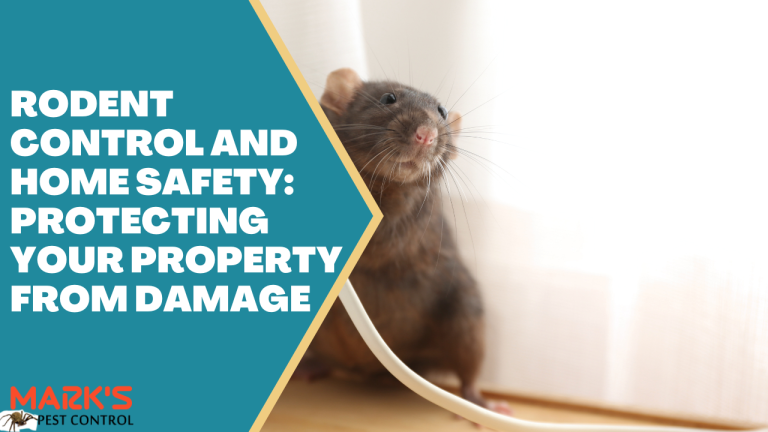Our homes are like cozy havens, where we find comfort and peace. But sometimes, unwanted guests like rodents can upset this harmony. In this article, we'll talk about different types of rodents that might come into our homes. We'll learn about their behaviors, what dangers they bring, and most importantly, how we can keep them away to protect our homes.
Rodents can bring about an array of potential harm to your property, impacting both its structural stability and your overall well-being. Here's a breakdown of the problems these pests can cause:
-
Structural Damage
Rodents, with their chewing habits, pose a threat to your property's structure. They gnaw on a variety of materials, including wood, wires, insulation, and even pipes. This can weaken crucial structures, resulting in compromised walls, ceilings, and electrical systems.
-
Contaminated Food and Surfaces
Rodents can pollute your food storage areas, pantry, and cooking spaces. Their presence can lead to foodborne illnesses as they leave behind droppings, urine, and hair, all of which can taint your food and utensils.
-
Health Hazards
Rodents act as carriers of diseases that can pose substantial health hazards to humans. Their presence can lead to the propagation of pathogens through contact, bites, or exposure to their droppings and urine. Diseases like hantavirus and salmonella, are examples of health issues linked to rodents.
-
Risk of Fire
Rodents' habit of chewing on electrical wiring escalates the threat of electrical shorts and sparks, potentially resulting in fires. Chewed wires can also disrupt your home's electrical systems, causing inconvenience and posing a safety risk.
-
Insulation Deterioration
Insulation, particularly in attics and walls, can be targeted by rodents in search of nesting materials. As they destroy insulation, its effectiveness diminishes, affecting your home's energy efficiency and possibly leading to higher utility costs.
-
Nesting and Unpleasant Odors
Rodents construct nests using materials they find within and around your property. These nests can be concealed in areas like wall voids and attics, generating unpleasant odors and harboring additional pests like mites, ticks, and fleas.
-
Landscaping and Garden Impacts
Certain rodents, such as squirrels, can inflict harm on your landscaping and gardens by digging up bulbs, seeds, and plants. Their burrows and tunnels can undermine the stability of walkways, decks, and other outdoor structures.
-
Financial Strain
Rectifying the destruction caused by rodents can be financially burdensome. From structural fixes to electrical repairs and pest control services, the financial costs can accumulate rapidly.
It's vital to take proactive steps to avert rodent infestations and address them promptly if they arise. By doing so, you can minimize the possible harm to your property and uphold a secure and pleasant living environment for you and your family.
Steps to keep our property safe from rodents
Keeping rodents away from your home and safeguarding your property from harm is crucial to maintaining a secure and pleasant living space. Rodents like mice, rats, and squirrels can wreak havoc on your property, causing structural damage, contaminating food, and even posing health risks. Here are some practical and compassionate methods to prevent rodents from intruding and ensure the safety of your property:
- Seal Entrances: Rodents can squeeze through minuscule openings, so it's vital to seal potential entry points. Examine your dwelling for gaps, fissures, and holes in walls, windows, doors, and foundations. Utilize durable materials such as steel wool or caulk to seal these openings, barring rodents' access.
- Keep Clean: A tidy setting deters rodents. Routinely eliminate crumbs, spills, and food remnants, particularly in cooking and eating areas. Utilize airtight containers for storing food to avert luring rodents. Maintain outdoor spaces free from clutter, as debris heaps can serve as hiding spots for these pests.
- Proper Waste Handling: Dispose of refuse in firmly sealed containers, both indoors and outdoors. Rodents are drawn to the aroma of food waste, so ensure garbage bins are securely sealed and regularly emptied. Manage compost heaps appropriately, and refrain from leaving pet food outside overnight.
- Trim Foliage: Overgrown bushes, trees, and shrubs offer refuge and effortless access for rodents to infiltrate your abode. Trim branches and vegetation that come into proximity with your residence, forming a barrier that rodents find hard to traverse.
- Organize Firewood: If you store firewood, elevate it and distance it from your home's exterior. Piling firewood against your house can offer rodents a convenient route indoors.
- Utilize Rodent-Repelling Flora: Certain plants, such as mint, lavender, and marigold, emit fragrances that rodents dislike. Plant these deterrent herbs and blossoms around your home's periphery to establish a natural defense.
- Secure Outdoor Structures: Sheds, garages, and outdoor storage areas can become hideouts for rodents if not securely sealed. Ensure these structures are tightly shut and devoid of gaps or openings.
- Eliminate Clutter: Unclutter your living spaces, both inside and outside. Rodents are more likely to establish nests in cluttered regions, so maintaining neatness can discourage them from taking up residence.
- Seek Professional Pest Management: If your rodent issue persists or escalates, contemplate seeking assistance from professional pest management services. They can provide effective and compassionate solutions tailored to your specific circumstances.
- Routine Assessments: Periodically scrutinize your dwelling's exterior and interior for indicators of rodent activity, such as gnaw marks, droppings, or nesting materials. Swiftly addressing any concerns can affect a minor predicament from evolving into a major infestation.
By applying these approaches, you can establish an environment that holds minimal appeal for rodents and safeguard your property against potential harm. An anticipatory and all-encompassing strategy to rodent prevention will help ensure a secure and comfortable home for you and your loved ones.
Understanding the Rodent Challenge
Rodents, including mice and rats, possess a knack for infiltrating homes in pursuit of sustenance, shelter, and water. Once indoors, they can chew through wiring, insulation, and even structural elements. Moreover, their droppings can disseminate ailments and allergens, rendering them a genuine concern for your family's well-being.

